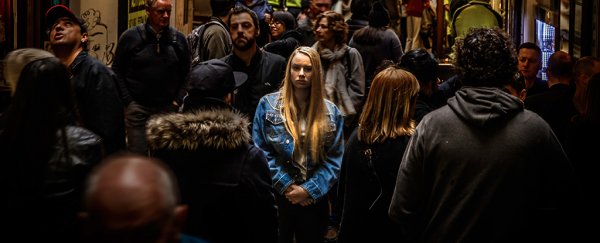You're probably familiar with the creeping sensation you get when you think someone's watching you. You don't know why, but suddenly you're convinced that someone is looking your way, even if you're alone in your house… But is this just a trick our brain plays on us, or are we actually sensing something that's really there?
According to science, we might actually be onto something - thanks to studies involving people with visual impairments, we know that the brain has a mysterious capacity to sense what's happening around us, even if we aren't actually 'seeing' it.
As Tom Stafford explains for BBC Future, research has shown that the eyes take in information beyond what's processed by our visual cortex - that part of the brain responsible for conscious vision and mapping out our view of the world.
One study published in 2013 looked at a male individual, referred to as TN, who was cortically blind, which means his eyes were in working order, but the visual cortex had been damaged, so it can't do its usual job of providing 'sight' in the traditional sense.
That means someone who is cortically blind can't 'see' what's around them, but their brain is still receiving information from their eyes. The condition gives us a chance to find out what our eyes take in beyond what our sight shows us.
In the case of TN, he was shown pictures of faces: some looking straight at him, and some with their gazes averted.
TN couldn't consciously see these pictures as we'd see a book or a landscape, but scientists noticed increased activity in his amygdala when people in the pictures were looking directly at him.
The amygdala is the part of the brain that prompts our sense of fear and other emotions, and handles facial recognition. Could it be that our brains are trained to subconsciously recognise someone staring at us, even if it's only in our peripheral vision?
This idea that a feeling of being watched is prompted by visual but subconscious clues is backed up by other research, which shows that we can tell the difference between a direct and averted gaze somewhere in our line of vision from as young as four months of age.
Being able to tell when someone is making eye contact is an important social skill, says psychologist Ilan Shrira from Lake Forest College. It helps us communicate and convey information, which could explain why the brain has evolved this important trick.
That said, the ability to sense that we're being watched only applies if the watcher is somewhere within our overall vision. While we might be able to pick up on a direct gaze subconsciously, it all happens through our eyes - we don't have a second pair of invisible pair of eyes in the back of our heads.
Several experiments have shown that we can't actually tell if someone is watching us from behind, even though it might sometimes feel like it.
But science does have a few simple explanations for why you might sense that someone is watching you from behind, and turn round to see a face staring back at you.
One possibility is that your observer has noticed you turning around, and looked up at you in return - so even though you're being watched, it's only because you've turned around.
Another explanation is that some slight clue has alerted you to the presence of someone else. It could be a reflection within your line of vision, or a faint sound behind you - not necessarily a sixth sense, just the standard five.
Perhaps we're also predisposed to assume that people are watching you, as a kind of defence mechanism, a 2013 study from the University of Sydney in Australia suggests.
The study found that people tended to assume they were being watched if the visual cues weren't decisive - for example, if someone nearby was wearing dark glasses hiding their eyes.
"So gaze perception doesn't only involve visual cues - our brains generate assumptions from our experiences and match them with what we see at a particular moment," explained University of Sydney psychologist, Colin Clifford.
So the next time you're feeling paranoid, remember to look for clues before you decide that someone's really watching you through the shutters. And maybe lay off the horror films for a bit.
H/T: BBC Future
